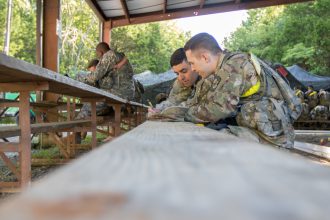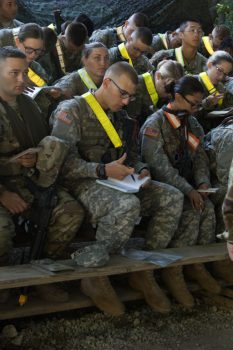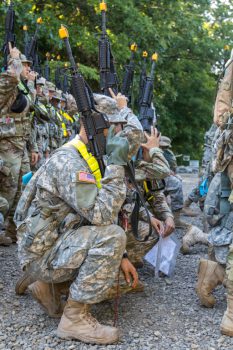FORT KNOX, KY.— “The Army has a lot of high-tech tools, but if something were to happen, we need to know how to navigate through the land, figure out terrain and be able to stick together to help each other out,” said Rachel Hickey, from Carson-Newman University.

Cadets Carlos Mcginity, left, from California Baptist University, and Chad Rockwell, right, from Arizona State University, practice plotting points and map reading skills, July 23, 2019, at Fort Knox, Ky. | Photo by Amy Turner, CST Public Affairs Office
On July 23, 2019, 5th Regiment Basic Camp Cadets got a hands-on learning experience on how to navigate through woods and terrain. These classes help prepare Cadets for their Land Navigation tests later in the day.
The Day Land Navigation test will occur after lunch and Cadets must locate four out of five points. During the Night Land Navigation test, Cadets must find two out of three points. These classes are a good time for Cadets to ask any last-minute questions.
Hickey, who has a hurt leg, is a little nervous for her tests, but is counting on her peers to encourage her and each other when they need it.
“We are all going to get lost at some point today because we are new, but this is our chance to step up and really show who we are and how we are going to lead today,” said Hickey.
According to Sgt. 1st Class Brenda Toledo, who is stationed at the University of California, Los Angeles, today’s classes are “a refresher on what the drill sergeants taught them in class” earlier this week. The courses included reminders on “hand association of the compass, checking to see how the compass works, their pace count and plotting points.”

Basic Camp Cadets from 5th Regiment listen and take notes as Cadre explain proper map reading procedures, July 23, 2019, at Fort Knox, Ky. Cadets get hands-on training for terrain association before their first land navigation test this afternoon. | Photo by Amy Turner, CST Public Affairs Office
“This is the second day [Cadets] are touching anything with land navigation,” said Toledo, “A lot of them have never been out in the woods by themselves so they get a little scared and they have never done this before.”
According to Toledo, this training is crucial to CST, since, “technology is a big thing, everyone uses Google Maps or Apple Maps, so, a lot of people do not use an actual map anymore. They do not know what that looks like.”
“Getting them to understand what everything is supposed to be, how it is supposed to work and actually using that to get you to your location” is something challenging for Cadets, she continued.
“We have to find our points, we have to know where we are at, if we lose a Soldier we have to know how to find them,” said Toledo, “We have to be able to tell higher where we are at so we can get rescued if need be.”
Once Cadets get the hang of land navigation, they are able to help others who are struggling. Toledo said, “this really gives you that confidence that you know what you are talking about. You can kind of help others, especially when you are good at something. Everyone has strengths and weaknesses, so we teach them that you can take part in that and be a leader.”

Basic Camp Cadets from 5th Regiment kneel after counting off their weapons, July 23, 2019, at Fort Knox, Ky. Cadets get hands-on training for terrain association before their first land navigation test this afternoon. | Photo by Amy Turner, CST Public Affairs Office
Since this is the first time for a majority of Cadets, Toledo said it is important not to give up because, “you never know what you are capable of. A lot of Cadets give up the first day, because it is too much, but you have to give it some time.”
Brody Haverstick, from Texas Christian University, said, “To be able to lead you need to know where you are at, so being able to go out into a field and get people from point A to point B in a timely manner is important.”
He was glad to go out in the field and do things hands-on instead of the classroom.
Haverstick said, “Night land navigation will be challenging, because you can only use your red lens flash light at certain times. You can only use it to read your map, then you have to turn it off and walk in the dark.”
Land Navigation prepares Cadets for the next summer when they go to Advanced Camp, according to Haverstick.
Adam Martin, from the University of Alabama, said, “Technology is great, but at any point it can shut down. If you do not know how to navigate the wood, if you are in the wood and you need to find a point, you are up a creek.”
Although he can find the points easily, the thing that Martin plans to focus on the most is his time management.
Land Navigation is important to have as a skill, because “if you are acclimated to the woods or any terrain, you can focus on the mission.”




